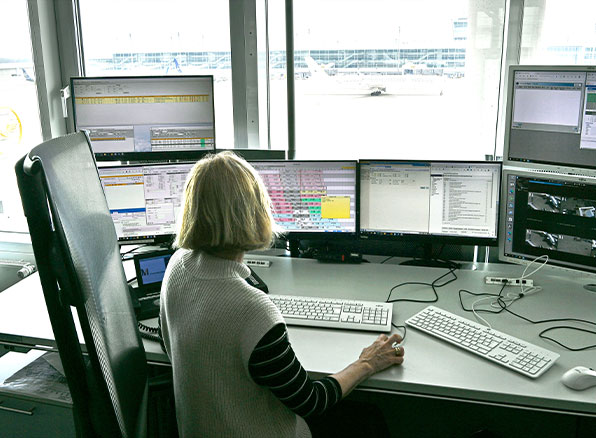Leveraging AI to optimise airline operations
How Lufthansa Group is making its operations more efficient and customer-oriented, and saves CO2 with the help of data analytics in the cloud
Aviation is a complex industry with numerous interconnected processes for smooth flight operations. Unforeseen events like bad weather or delays can cause irregularities which demand swift, intricate adjustments throughout the system. Quick decision-making is crucial to ensure passengers can reach their destinations.
“Every flight represents an intricate scenario, influenced by thousands of diverse variables,” says Christian Most, senior director of digital operations optimisation at Lufthansa Group. “The system in which each flight is embedded is very fragile and sometimes not resilient enough for aviation’s volatility or disruptive influences.”
Recognising the need for an optimised and agile approach to handle operational irregularities, Lufthansa Group, which operates 11 airlines in Europe, looked for new ways to derive insights from airline data quickly enough to route planes, adjust rotations and direct passengers. This was easier said than done. The technology that Lufthansa Group needed to realise this vision did not exist. So, the company set out to build it with the help of Google Cloud.
Lufthansa Group airlines, like their competitors, manage separate, complex phases of operations, including aircraft maintenance, rotation management and passenger routing.
“Each of these domains is dominated by an individual data source and major system,” Mr Most says. The goal for the partnership with Google: to develop a platform with access to Lufthansa Group’s existing systems that could make recommendations for flights, crew rotations and more in a single optimisation. “This is a very complex thing to do,” he says. “And that’s why we chose Google Cloud.”
Lufthansa Group chose Google Cloud not just for its consistently secure infrastructure, but also for its expertise in innovation and its operations research capabilities.

Hero image: Lufthansa
(Photographer Oliver Rösler)
Flying smarter, using data
Working closely with Google engineers, and using BigQuery, Spanner, Vertex AI and other Google Cloud tools, the Lufthansa Group team began developing a set of applications collectively called the Operations Decision Support Suite (OPSD). OPSD is intended as a support tool for OPS controllers to give them easy access to the information they need to make the best decisions more quickly. It is designed to pull data into the cloud for analysis by artificial intelligence (AI), taking in crew availability and locations, passenger demand, aircraft maintenance status, weather, and many other variables. It will then send suggested scenarios – for example, a particular aircraft for a specific flight – to human operations controllers to support their decision-making.
“The acceptance rate of the scenarios is an average of 90%, which is great,” Mr Most says. In other words, operations controllers trust AI to make the right suggestion nine out of ten times.
The system should help the group to run more robustly, getting planes, crews and passengers to the right places at the right times, and heading off delays. All this will ultimately enhance the air passenger experience. But it also has the potential to help the company to reduce costs. For example, it can let controllers know whether a plane has engines leased from the manufacturer or owned by the airline. Leased engines can be more expensive to operate, and before OPSD, controllers did not have the details they needed to make the most cost-effective choices.
“It’s impossible for an ops controller to know on what aircraft what engine is installed,” Mr Most explains. “But it’s very easy for an IT system to calculate it.”
Achieving financial resilience
Savings in the clouds
OPSD also delivered cost savings from actions such as deploying smaller planes, which generate lower air traffic control fees, on flights with lower demand. When flight operations are optimised, this usually also benefits sustainability. SWISS, a subsidiary airline of the Lufthansa Group, saved around 8,700 tonnes of CO2 in 2022 with more precise allocation of aircraft and routes. Projected for the Lufthansa Group airlines, annual CO2 emissions could thus be reduced by around 50,000 tonnes.

The team plans to scale the system across Lufthansa Group’s airlines following its successful use by SWISS. “When we have multiple airlines on the platform, we will look at multi-hub steering,” Mr Most says. “So, optimisation across multiple airlines at the same time, because that’s our biggest strength at Lufthansa Group, that we have multiple airlines to serve our customers."
Ultimately, Mr Most sees the benefits of OPSD extending beyond Lufthansa Group’s airlines as it could help improve airport traffic and air traffic control. “It’s a tremendous road that we’ve just started on,” he says.


